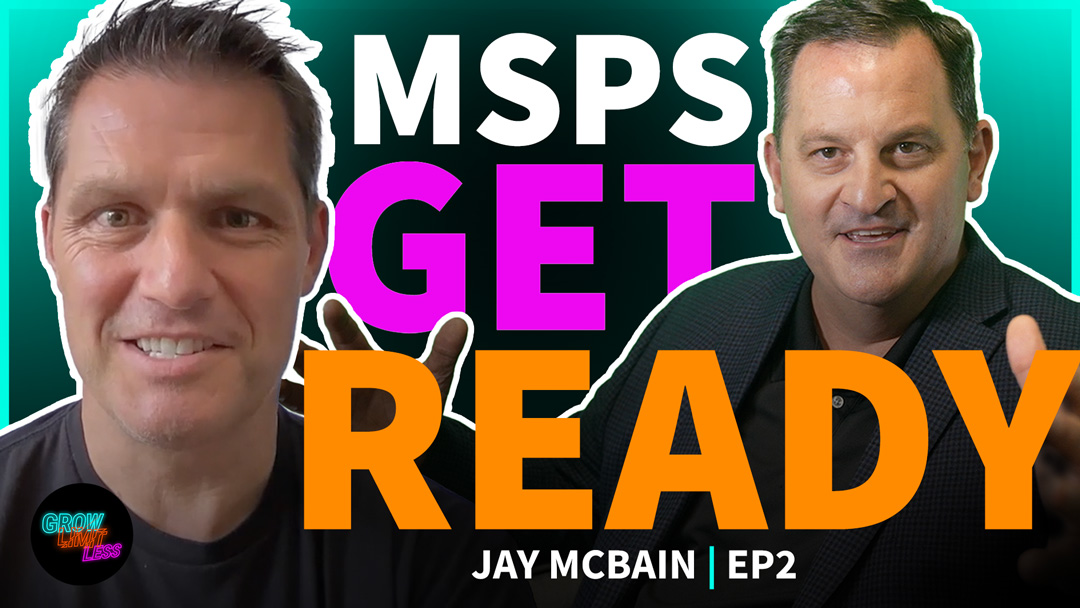Channel Partner Sales: Secrets to Making MSP Partners Sell More
If MSPs don’t sell, vendors don’t make money, but many managed service providers (MSPs) struggle with sales; not because they don’t believe in your product, but because they don’t have the time, resources, or training to sell it effectively. That’s why channel partner sales are so important. When vendors actively support their MSP partnerships, both sides win.
Many vendors assume that because an MSP has signed on as a partner, they’ll naturally sell the product. But without proper training, marketing support, and sales enablement, MSPs often default to selling the solutions they’re most familiar with – even if yours is the better option. To maximize revenue and make sure your solutions stand out, you need to take an active role in helping referral partners close more deals.
Below, we’ll look at some of the key problems MSPs have when selling vendor solutions and outline some clear steps vendors can take to improve their channel sales strategy and help MSPs win more direct sales.
Why MSPs Struggle to Sell More
They don’t have time for sales and marketing
Most MSPs are technical experts, not salespeople. Their priority is delivering IT services, keeping their clients’ systems running, and troubleshooting technical issues. Sales and marketing often take a backseat, which means they rely on referrals, word-of-mouth, or inbound leads from their website. This passive approach limits their ability to scale.
Many channel sales partners want to sell more, but they simply don’t have the bandwidth to dedicate to lead generation, content creation, or outbound prospecting. Without structured sales and marketing support, they struggle to build a steady pipeline.
They don’t understand what makes your product different
MSPs typically work with multiple vendors that offer similar solutions. If potential partners don’t have a clear understanding of why your product is better—or how to position it against the competition—they won’t proactively sell it.
Vendors often assume that new partners will take the time to research and compare solutions themselves, but in reality, they’re too busy running their business. If the messaging isn’t clear, MSPs will default to selling whatever they’re most comfortable with, even if your product is the superior choice.
Pricing is too complex
Complicated pricing models create friction in the sales process. If reseller partners struggle to explain your licensing structure, tiered pricing, or long-term costs, potential customers will look elsewhere.
Many vendors unintentionally make pricing difficult by offering too many options, requiring custom quotes for every deal, or using vague pricing structures that don’t clearly communicate value. If an MSP can’t quickly and confidently explain why your pricing makes sense, they won’t push your product.
They don’t get enough sales training
Vendors often provide excellent technical training but fail to equip MSPs with the sales skills needed to close deals. Knowing how a product works is not the same as knowing how to sell it. Given that the vendor-MSP channel sales model depends on MSPs making direct sales, in turn giving vendors indirect sales, your business model success depends on how well an MSP can market and sell your product for you.
Many MSPs struggle with objection handling, upselling, and articulating the business benefits of a solution. If vendors don’t provide structured sales training, an MSP sales team will struggle to generate demand and convert leads.
MDF funds aren’t used effectively
Market Development Funds (MDF) are a valuable resource for channel partnerships, but many MSPs don’t know how to use them effectively. They either don’t apply for MDF at all or use them on marketing activities that don’t drive results.
Without clear guidance, MDF funds often go toward one-off campaigns that lack strategy. Vendors that don’t provide structured support for MDF usage risk seeing those funds wasted or underutilized.
How Vendors Can Help MSPs Sell More
Provide ready-to-use marketing materials
Since most MSPs don’t have a dedicated marketing team, vendors should provide plug-and-play marketing materials that require minimal effort to deploy. These can include:
- Co-branded email campaigns MSPs can send to their clients
- Social media posts that promote vendor solutions
- White-labeled blog content for MSP websites
- Lead magnets such as eBooks or checklists MSPs can use for lead generation
Making marketing easy for MSPs increases the likelihood that they’ll actively promote your solution instead of waiting for inbound leads.
Create simple, clear positioning materials
To differentiate your solution from competitors, you should provide clear, easy-to-understand messaging that MSPs can use in sales conversations.
- One-page competitive comparison sheets that highlight key differences between your product and competing solutions
- A short, 30-second elevator pitch MSPs can use to explain why your solution is the best choice
- Case studies that show real-world success stories MSPs can share with their clients
The goal is to make it as easy as possible for MSPs to confidently articulate why your solution is the right fit.
Simplify pricing and create ROI tools
To remove pricing-related friction, vendors should offer:
- Transparent pricing guides that break down costs in a way MSPs can easily explain to prospects
- Bundled pricing options that make it easier for MSPs to package and sell services
- An ROI calculator MSPs can use to demonstrate the value of your solution in financial terms
By making pricing easier to understand, MSPs can have more confident sales conversations and close deals faster.
Offer sales training, not just technical training
MSPs don’t just need to understand how your product works—they need to know how to sell it. Vendors should provide structured sales training that covers:
- How to handle common objections (e.g., “We don’t need this right now” or “It’s too expensive”)
- How to identify upsell and cross-sell opportunities
- How to effectively communicate business value instead of just technical features
Hosting live sales training sessions, creating on-demand video courses, and offering one-on-one coaching can help MSPs build confidence in selling your product.
Provide structured guidance on MDF usage
Instead of leaving MDF spending up to MSPs, you should offer clear recommendations on how to use the funds effectively.
- Pre-built marketing campaigns that MSPs can launch with MDF
- A list of high-ROI activities (such as paid ads, webinars, or content marketing) MSPs should prioritize
- Case studies that show how other MSPs successfully used MDF to generate leads and close deals
By making MDF usage simple and strategic, you can make sure funds are spent on activities that drive measurable results and customer success.
Conclusion
Channel partner sales is about actively enabling MSPs to sell. MSP partnerships really thrive when vendors provide proper sales support and active customer relationship management, not just technical training.
By simplifying marketing, clarifying your USP, streamlining pricing, offering sales training, and guiding MDF usage, you can remove the roadblocks that prevent MSPs from selling more.
If you want to maximize sales through your channel, Marketopia can help. Our expert-led training, marketing resources, and sales enablement strategies support MSPs to confidently sell vendor solutions. Contact us today to learn how we can drive more sales through your channel.
FAQs About Partner Sales
What are channel partner sales?
Channel partner sales is the process of vendors working with MSPs and other partners to sell their products and services. A strong channel strategy helps vendors expand their reach and drive more revenue
How can vendors improve channel partner sales?
Vendors can improve channel partner sales by providing clear product positioning, sales training, and marketing resources. Supporting MSPs with MDF funds and lead generation also helps drive more sales.
Why do MSPs struggle with channel partner sales?
Many MSPs struggle with channel partner sales because they lack sales expertise, marketing support, and clear differentiation between vendor solutions. Vendors that simplify messaging and provide structured sales enablement see better results.
What role does training play in channel partner sales?
Sales training is critical in channel partner sales. Vendors should teach MSPs how to handle objections, position solutions against competitors, and close deals effectively—not just how the product works.
How can vendors support MSPs in channel partner sales?
Vendors can support MSPs in channel partner sales by offering co-branded marketing materials, simplifying pricing, providing competitive positioning resources, and giving clear guidance on MDF usage.







